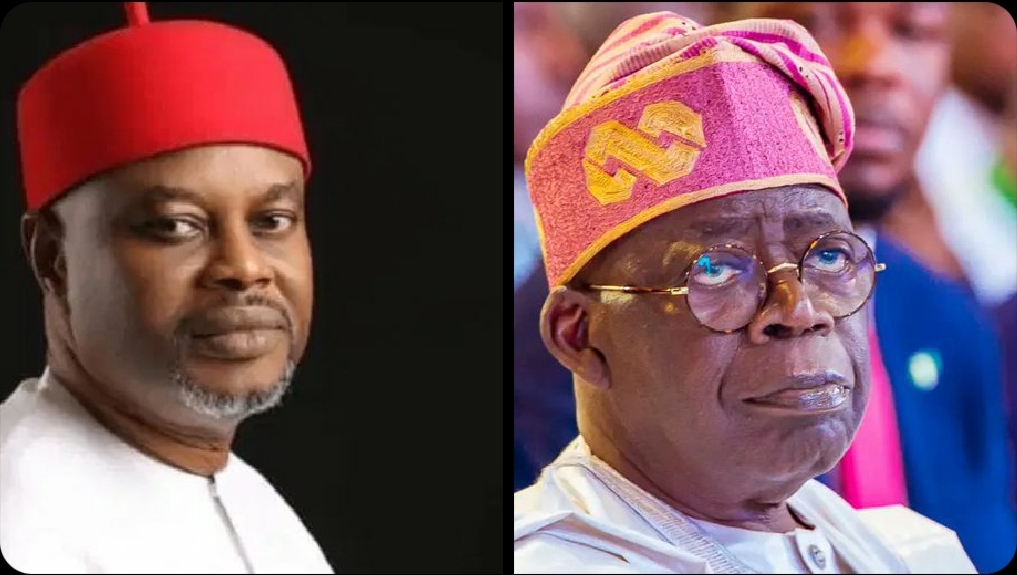
“She’s Gone Silent”: Deeone Sparks Outrage with Claim That Peller Is More Relevant Than Genevieve Nnaji

LAGOS, Nigeria — The internet erupted in a firestorm of opinions, arguments, and backlash after comedian and former Big Brother Naija housemate, Deeone, made a controversial claim that has sent waves across Nigeria’s entertainment sphere. In a candid interview with Pulse Nigeria, the outspoken entertainer stirred debate by asserting that social media influencer and nightlife personality, Peller, is now more relevant than Nollywood icon Genevieve Nnaji. For many, it was not just a hot take — it was a direct shot at one of Nigeria’s most beloved cinematic legends.
In the interview, Deeone didn’t mince words as he leaned heavily into a social-media-centric view of fame and relevance. “What makes her different from a normal actress?” he quipped, dismissively. “Peller right now on the social media space is bigger than Genevieve.” That statement alone, delivered with the confidence of a man certain of his point, triggered a deluge of criticism and divided public opinion. While some accused Deeone of chasing clout and disrespecting a pioneer, others sided with his argument about the evolving dynamics of modern celebrity.
The crux of Deeone’s argument lies in the weight he places on social media visibility. He pointed to Genevieve’s relatively quiet online presence as a major factor in what he describes as a decline in her public relevance. While Genevieve Nnaji maintains a dignified and often elusive persona, rarely making social media appearances, Peller—well known for his event promotions, flashy lifestyle, and digital engagements—has consistently captured online attention. In Deeone’s view, that makes all the difference in today’s fast-paced, algorithm-driven world.
“Gone are the days when you could disappear and remain a star,” he continued. “Now, you stop posting for six months and they move on. The world moves on.” For a younger generation raised on TikTok trends and Instagram reels, he might not be entirely wrong. But when it comes to Genevieve Nnaji, the conversation is far more complex.
Genevieve Nnaji is not just an actress. She’s an institution in Nollywood, often hailed as one of the foundational pillars of the Nigerian film industry’s global growth. With classics like Ije, Lionheart, and Half of a Yellow Sun, she’s crossed boundaries, opened doors, and redefined what it means to be a Nigerian actress on the world stage. In 2018, her directorial debut Lionheart was acquired by Netflix, making it the first Nigerian film to be streamed on the platform. That moment wasn’t just historic; it was transformative.
But Deeone’s commentary suggests that accolades and past achievements, no matter how groundbreaking, are not enough to maintain cultural dominance in 2025. In his words, “People want to see you. They want to know what you’re wearing, what you’re eating, who you’re dating. That’s relevance.” And perhaps in an age where followers, trends, and engagement are the new currency of fame, there is a bitter truth in his statement.
However, critics were quick to fire back. Fans of Genevieve Nnaji flooded social media with tributes to her work, reposting her movie scenes, interviews, and career milestones. Many labeled Deeone’s remarks as disrespectful and short-sighted. “Genevieve walked so these TikTok celebrities could run,” one fan tweeted. Another wrote, “Peller is trending because of bottle service. Genevieve is trending because she changed the game. There’s a difference.”
Others accused Deeone of weaponizing controversy for relevance himself, a strategy not uncommon in the entertainment industry. “This is classic trolling,” a Twitter user commented. “Say something outrageous about a legend and watch your name trend for 48 hours. Mission accomplished.” Indeed, within hours of the interview’s release, Deeone’s name shot to the top of Nigeria’s trending topics, eclipsing even the initial subject of his critique.
Interestingly, Peller himself has remained silent amid the growing online drama. Known more for his flamboyant lifestyle and digital entrepreneurship than for any ties to the film industry, Peller is a dominant force in nightlife promotion and social media influence. His brand thrives on visibility, partnerships, and public appearances — a stark contrast to Genevieve’s minimalist and often mysterious digital presence.
Still, the bigger issue may not be about who is more relevant, but what “relevance” means in an era where virality can substitute for legacy. The entertainment landscape has shifted dramatically over the past decade. While in the past, actors and musicians built careers on bodies of work and slow-earned acclaim, today’s fame is often instant, built on viral content, influencer culture, and the ephemeral nature of social media trends. And in that world, silence can be costly — or, in Genevieve’s case, deeply misunderstood.
One entertainment journalist weighed in, “What Deeone fails to understand is that some celebrities choose to preserve their mystique. Genevieve doesn’t post because she doesn’t have to. Her name alone generates headlines. That’s real influence. That’s timeless relevance.”
As the debate raged, Pulse NG's video featuring the full segment of Deeone’s comment drew tens of thousands of views. In it, Deeone appears unbothered by the potential backlash. Alongside co-hosts Tosin Silverdam, Cera the Cera, and Nancy Chukwudebe, he stood firm in his views, repeating that social media metrics are the clearest indicators of public interest today. “It’s not shade. It’s reality,” he added.
But for many fans of Nigerian cinema, especially those who grew up with Genevieve’s face gracing their VHS tapes and cinema screens, the conversation is about more than just Instagram algorithms. It’s about respect. It's about history. It’s about understanding that not all relevance can—or should—be measured in likes and views.
Deeone’s statement has certainly opened up a broader cultural dialogue, one that touches on fame, digital presence, generational divides, and the cost of silence in a noisy world. Whether his hot take was born out of genuine belief or a clever ploy for virality, one thing is clear: he got the world talking.
And in the entertainment industry, sometimes, that’s all that matters.


